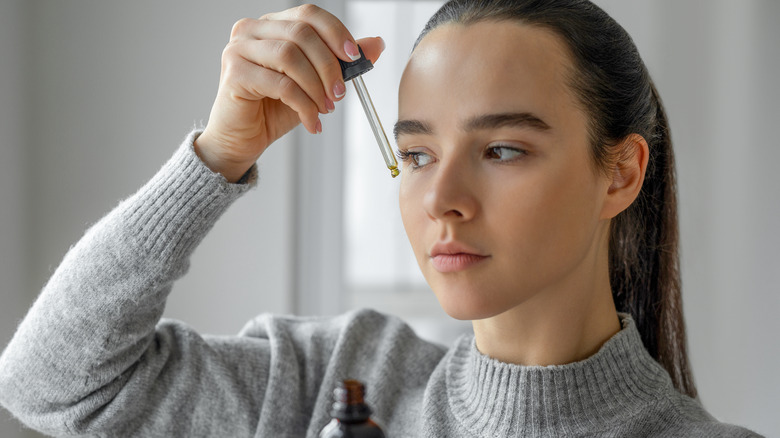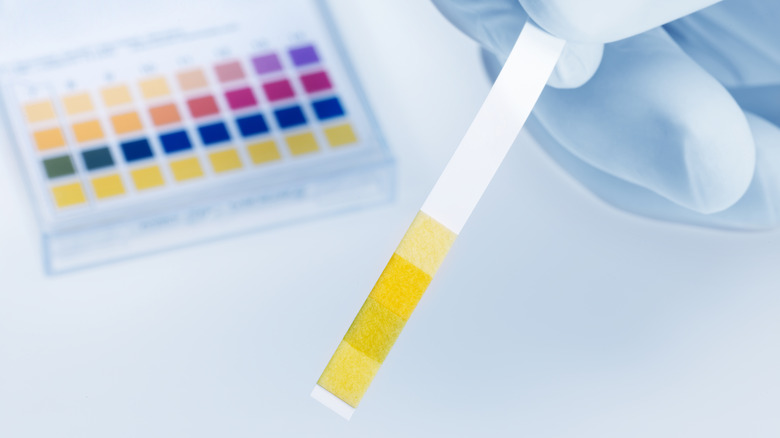Are pH Balancing Skincare Products Really Necessary? It's Complicated
When it comes to skincare, there are so many terms and concepts to learn that trying to memorize even half of them is enough to make your head spin. But really, though, if you're only willing to grasp a handful of them, make sure that pH is part of that list. Yes, pH, as in the same term your high school chemistry teacher taught you in class by way of litmus papers way back when.
As a refresher, pH is short for "potential of hydrogen" and functions as some sort of barometer of how acidic or alkaline something is. The pH scale measures from 0 to 14, with 0 being the most acidic, 7 being neutral, and 14 being the most alkaline. For your skin to be healthy, experts say that its pH balance should tread between 4 and 7, with 5.5 being considered ideal. "The skin's pH maintains the balance of acidity and alkalinity that protects us from germs, the elements, and toxic substances while keeping us keeping us hydrated and storing nutrients and minerals," Dr. Mehmet Oz, a medical expert, told Good Housekeeping.
Now your skin's pH balance can sometimes be disrupted due to a number of factors, including your diet, sleep, hydration, environment, and even the products you use. When that happens, your skin may either be too dry or more susceptible to acne. And while there are products in the market that claim to restore the balance, do you actually need them? The short answer: not really.
Your skin is capable of rebalancing its pH level on its own
Keeping up with a multi-step skincare routine is hard enough, so the last thing you want is to add more products to your regimen. Fortunately, science says that your skin is designed to rebalance its pH level on its own, so you don't really have to do much — or anything, really — to maintain its balance. You can remove those pH-balancing toners and serums from your shopping cart now.
"Skin care products with a pH higher than 5.5 will temporarily bring up the pH in your skin. Guess what? So will the water used to wash your face!" cosmetic chemist Ni'Kita Wilson explained to Refinery29. "The skin is able to regulate these small variations — if it couldn't, we'd be having major issues every time we stepped out of the shower."
And even if your skin's pH balance won't return in a snap, there's another way that it can rebalance itself, and it's through perspiration. Dr. Luigi L. Polla, dermatologist and founder of Alchimie Forever, shared with The Zoe Report that sweat helps in managing your skin's pH levels. "The secretions of eccrine (sweat) glands are composed of lactic acid, undecylenic acid, and urocanic acid. These acidic secretions are part of the skin's defense mechanism against microorganisms." In short: if you're not doing anything extreme that compromises your overall skin health, you don't have to worry too much about your pH balance. Your skin can look after itself.
When it may be worth using pH-balancing products
Then again, even if you don't necessarily have to use pH-balancing products on a regular basis, there may be times that you may need to reach out for them, especially when your skin is in distress mode. If you notice that your skin has been compromised, dermatologist Dr. Hadley King suggests trying products that aim to "restore skin barrier function, like humectants such as glycerin and hyaluronic acid to hydrate." She also told Skincare.com that "barrier-restoring lipids like ceramides and petrolatum can help lock in moisture and restore and protect."
It also helps to make some lifestyle adjustments, like eating a better diet, keeping yourself hydrated, and sleeping more — all of which are what you're supposed to be doing anyway. Sometimes, using fewer products can be the key, too. "Going back to basics (with a balanced face wash and lotion) for a few weeks can calm skin problems, and prep skin for more targeted treatments," Dr. Marnie Nussbaum, a board-certified dermatologist, shared with Byrdie.
More often than not, you don't have to fuss too much about whether the products you're using are affecting your pH balance. New York City–based dermatologist Dr. Cheryl Karcher told Everyday Health that most, if not all, skincare products are formulated to keep the balance in check. "[Skincare scientists are] very smart people, these PhDs making these skin-care products," she said. "They know that you have to have something close to the pH of the skin or else it's not going to be cosmetically appealing — it's going to burn."


